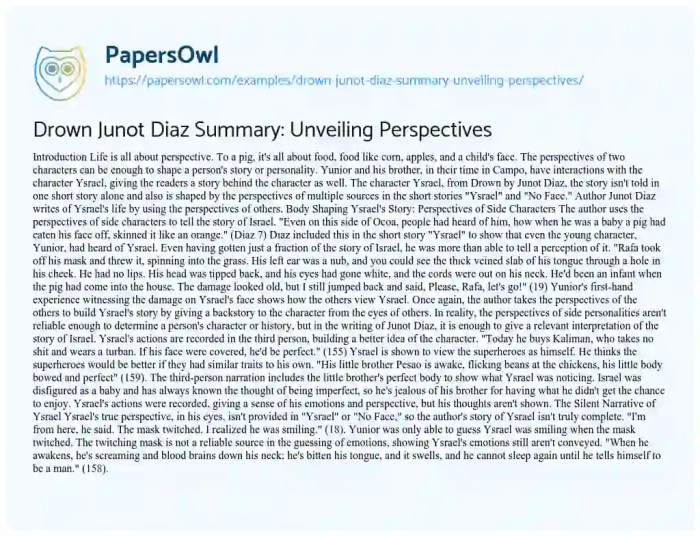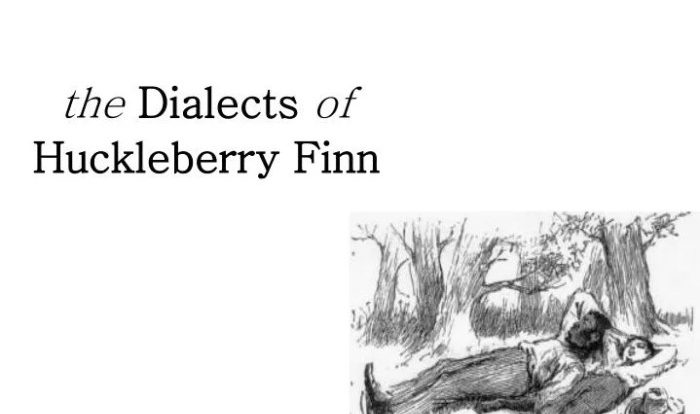Drown Junot Diaz Chapter Summary delves into the complexities of identity, family, and loss through the poignant narrative of Yunior, a young Dominican immigrant grappling with his place in a foreign land. Junot Diaz’s masterful storytelling and evocative prose paint a vivid and unforgettable portrait of the immigrant experience.
The chapter follows Yunior as he navigates the treacherous waters of adolescence, haunted by the memories of his traumatic past. Through his dreams and aspirations, we witness the resilience and vulnerability of a young man struggling to find his footing in a world that often seems hostile and unwelcoming.
Synopsis of “Drown” by Junot Díaz
In “Drown,” the protagonist, Yunior, a Dominican-American writer, recalls a traumatic childhood experience that profoundly shaped his life. The chapter opens with Yunior at a swimming pool, reflecting on the day he almost drowned at age ten.
Protagonist and Struggles
Yunior, a sensitive and introspective child, faces various challenges. He struggles with feelings of inadequacy and isolation due to his immigrant background and his family’s poverty. He also grapples with his sexuality and the homophobia he experiences in his community.
Central Conflict and Resolution
The chapter’s central conflict arises when Yunior and his younger brother Rafa decide to swim in a deep end of the pool without adult supervision. Yunior panics when he realizes he cannot swim and begins to drown. In a moment of desperation, Rafa rescues him, saving his life.
The resolution of the conflict occurs both physically and emotionally. Yunior is physically saved from drowning, but he also undergoes an emotional transformation. The experience forces him to confront his fears and vulnerabilities, and it ultimately strengthens his bond with his brother.
Character Analysis of Yunior
Yunior is the narrator and protagonist of “Drown,” a complex and introspective character whose personality, motivations, and relationships are shaped by his past experiences. His dreams and aspirations provide insights into his hopes and fears, revealing the depth of his character.
Yunior’s Personality
Yunior is a sensitive and introspective individual, often struggling with feelings of inadequacy and insecurity. He is a voracious reader and a gifted storyteller, using his imagination to escape the harsh realities of his life. Despite his intelligence and creativity, Yunior is prone to self-sabotage, often making impulsive decisions that lead to negative consequences.
Yunior’s Motivations
Yunior’s primary motivation is to escape the poverty and violence of his childhood. He dreams of becoming a successful writer and leaving behind the Dominican Republic for a better life in the United States. However, his fear of failure and his self-destructive tendencies often hinder his progress.
Yunior’s Relationships
Yunior’s relationships are complex and often fraught with tension. He has a strained relationship with his mother, who left him when he was young. He is also haunted by the memory of his father, who was killed in the Dominican Republic.
Yunior’s romantic relationships are equally troubled, as he struggles to find a sense of intimacy and connection.
Yunior’s Past Experiences
Yunior’s past experiences have had a profound impact on his character. His childhood was marked by poverty, violence, and abuse, which left him with deep emotional scars. These experiences have made him wary of trusting others and have contributed to his feelings of inadequacy and insecurity.
Yunior’s Dreams and Aspirations
Yunior’s dreams and aspirations provide a glimpse into his hopes and fears. He dreams of becoming a successful writer and leaving behind the Dominican Republic for a better life in the United States. These dreams represent his desire for escape and his belief in the transformative power of education.
Themes and Symbolism
Junot Díaz’s “Drown” explores profound themes through intricate symbolism, creating a nuanced and thought-provoking narrative.
Identity, Drown junot diaz chapter summary
The chapter delves into the complexities of identity, particularly the struggles of a young Dominican-American boy navigating two distinct cultures. Yunior’s experiences in the United States and the Dominican Republic highlight the challenges of reconciling his heritage with his American upbringing.
- The duality of Yunior’s name, both Spanish and English, reflects his dual identity.
- His experiences with racism and prejudice in the United States shape his sense of self and his relationship with his Dominican heritage.
Family
Family plays a central role in “Drown,” exploring the complexities of familial bonds and the impact of loss.
- Yunior’s strained relationship with his father and the absence of his mother highlight the challenges of growing up in a dysfunctional family.
- His interactions with his grandmother and other relatives provide glimpses of the importance of family ties and the cultural traditions that shape his identity.
Loss
The chapter is permeated by a sense of loss, both physical and emotional.
- The drowning of Yunior’s friend Beto symbolizes the loss of innocence and the fragility of life.
- Yunior’s struggles with depression and his inability to connect with others highlight the emotional toll of loss.
Symbolism
Díaz employs powerful symbolism to convey the chapter’s themes:
- Water and drowning:Water symbolizes both life and death, mirroring Yunior’s struggle with identity and his emotional turmoil.
- The ocean:The vastness of the ocean represents the challenges and uncertainties of life.
- The beach:The beach symbolizes both beauty and danger, reflecting the duality of Yunior’s experiences.
Setting
The chapter’s setting in the Dominican Republic contributes to its thematic development:
- The tropical climate and vibrant culture provide a backdrop for Yunior’s exploration of his identity and his connection to his heritage.
- The poverty and social inequality he witnesses highlight the challenges faced by many in the Dominican Republic.
Literary Techniques

Junot Díaz employs a rich tapestry of literary techniques in “Drown” to create a vivid and immersive reading experience. His use of language, imagery, and narrative structure contribute significantly to the chapter’s tone and atmosphere, enhancing its overall effectiveness.
Language
Díaz’s use of language is characterized by its authenticity and raw emotion. He employs colloquialisms, slang, and profanity to capture the voice and perspective of Yunior, the protagonist. This informal style creates a sense of immediacy and intimacy, drawing the reader into Yunior’s world.
Imagery
Díaz’s vivid imagery evokes a strong sensory experience for the reader. He uses concrete and evocative language to create a visceral depiction of Yunior’s surroundings and inner thoughts. The recurring motif of water, for example, symbolizes both the threat and the allure of the unknown.
Narrative Structure
The chapter’s narrative structure is fragmented and non-linear. Díaz employs flashbacks, stream-of-consciousness, and shifting perspectives to create a disorienting and unsettling atmosphere. This structure reflects Yunior’s own fractured and fragmented memories, highlighting the psychological impact of his traumatic experiences.
Comparison to Other Works

Junot Díaz’s “Drown” shares several similarities and differences with his other short stories and novels.
Themes
Like many of Díaz’s works, “Drown” explores themes of identity, race, and masculinity. The story also deals with the complexities of family relationships, particularly between fathers and sons.
Characters
Yunior, the protagonist of “Drown,” is a complex and flawed character who shares similarities with other protagonists in Díaz’s work. Like Oscar Wao in The Brief Wondrous Life of Oscar Wao, Yunior is a young Dominican-American man struggling to find his place in the world. However, Yunior is also more self-destructive and less sympathetic than Oscar.
Writing Style
Díaz’s writing style in “Drown” is characterized by its use of Spanglish, slang, and colloquialisms. This style helps to create a sense of authenticity and immediacy, and it also reflects the characters’ Dominican-American backgrounds.
Place in Díaz’s Larger Body of Work
“Drown” is an important work in Díaz’s larger body of work. It is one of his most anthologized stories, and it has been praised for its powerful storytelling and its insights into the Dominican-American experience.
Historical and Cultural Context

The chapter “Drown” by Junot Díaz is set in the Dominican Republic during the dictatorship of Rafael Trujillo. Trujillo’s regime was characterized by violence, repression, and corruption, and had a profound impact on the lives of Dominican people.
Influence of Dominican Culture
The story is deeply influenced by Dominican culture. The characters’ beliefs, values, and behaviors are shaped by their Dominican heritage. For example, Yunior’s machismo and his belief in the importance of family are both common Dominican cultural traits.
Experiences of Immigrants in the United States
The chapter also reflects the experiences of immigrants in the United States. Yunior and his family immigrated to the United States when he was a child. He struggles to adjust to American culture and often feels like an outsider. The chapter explores the challenges and rewards of being an immigrant in a new country.
Critical Reception
Junot Díaz’s “Drown” has received widespread critical acclaim since its publication in 1996. Critics have praised the chapter’s raw and unflinching portrayal of immigrant life in the United States, as well as its exploration of themes such as identity, masculinity, and trauma.
Strengths
- Authenticity:Critics have lauded “Drown” for its authentic and unflinching portrayal of immigrant life in the United States. Díaz’s writing is raw and honest, and he does not shy away from difficult topics such as poverty, violence, and racism.
- Character Development:The characters in “Drown” are complex and well-developed. Yunior, the narrator, is a particularly compelling character. He is flawed and often unlikeable, but he is also sympathetic and relatable.
- Lyrical Prose:Díaz’s prose is lyrical and evocative. He uses language in a way that is both beautiful and powerful.
Weaknesses
- Length:Some critics have found “Drown” to be too long. The chapter is over 100 pages long, and some readers have found it to be a bit of a slog.
- Graphic Content:“Drown” contains some graphic content, including violence and sexual abuse. This content may be disturbing to some readers.
Significance
“Drown” is a significant chapter in contemporary literature. It is a powerful and moving portrayal of immigrant life in the United States. The chapter has also been praised for its exploration of themes such as identity, masculinity, and trauma.
FAQs: Drown Junot Diaz Chapter Summary
What is the central conflict in Drown?
Yunior’s struggle to reconcile his Dominican heritage with his American upbringing.
How does water symbolism contribute to the chapter’s themes?
Water represents both the life-giving force of Yunior’s memories and the threat of drowning in the challenges of his present.
What is the significance of Yunior’s dreams?
Yunior’s dreams provide glimpses into his subconscious, revealing his fears, desires, and aspirations.
